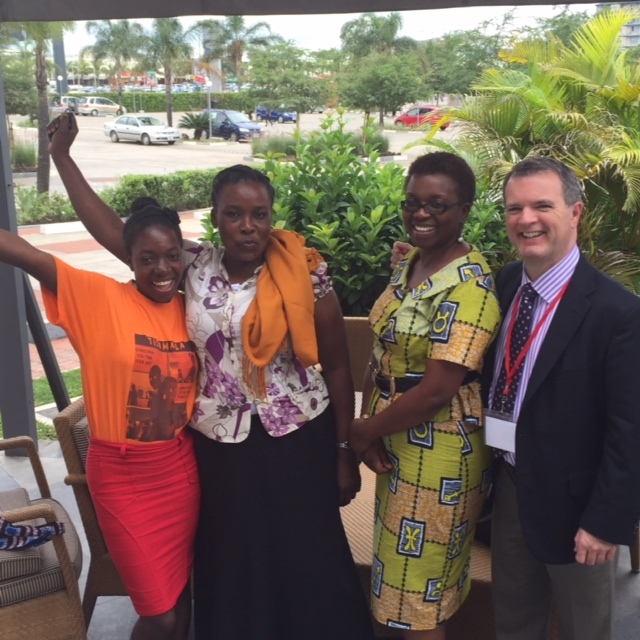In Zambia, the Elizabeth Glaser Pediatric AIDS Foundation (EGPAF) works with local partners on a mentor program to provide support to adolescents dealing with the everyday struggles of HIV. Given Mwanza, a peer counselor in Zambia living with HIV, describes how she gained hope to overcome the challenges of the virus.
I am a 19-year-old student living in Lusaka, Zambia. I’m preparing to enter university soon so that I can fulfill my childhood dream to become a doctor.
I have been living with HIV for my entire life, but it was only four years ago that I learned about my status. Fortunately, I have a lifeline: the Tisamala Teen program started by EGPAF. Through this program, I was selected and trained to become a peer mentor, which gives me the opportunity to help give other HIV-positive teens hope that they can live positively.
When I was a baby, my aunt took me in and raised me as her own child. As a young girl, I did not know that I had HIV, but my aunt suspected that I might be because my birth mother was HIV-positive. Not wanting to concern me, though, my aunt kept silent about her worries.
When I was 12, I became frequently ill. Finally, my aunt brought me to get tested for HIV at Our Lady’s Hospice near our home in Lusaka. The doctor told my aunt that the result was positive for HIV, and he gave her medicine for me. But my aunt did not disclose my status to me. I took the medicine each day, but I did not know what it was for.
The Shock of Discovery
Then one afternoon in 2011, I went to the clinic as usual to pick up my medicine and have a check up. The doctor was with another patient, so a counselor handed me my medical folder to give to the doctor. Being a curious teen, I peeked inside.
In the five seconds that it took me to read my file, I learned that I am HIV-positive. My world stopped. In shock, I put a fake smile on my face and met with my doctor without admitting that I now knew about my HIV status. Then I picked up my medicine and went home. I went straight to my bedroom and cried.
“Why me, Lord?” I begged. “Am I cursed? Am I worthy of living?”
The next day I went to school as usual, trying to act as normal as possible. Unfortunately, as I was chatting with my friends, the topic of HIV came up. My friends began to make jokes about people who are HIV-positive. I laughed along with them, but inside I was crying. I knew that my life had changed forever. You can’t just take HIV off like an article of clothing.
Tisamala Teens
Fortunately, I was referred to the Tisamala Teens Program. There, I met other people my age who were dealing with the emotional weight of adolescence along with the psychological and social implications of being HIV-positive. In our local language, Tisamala means means “we care.” When I came to the program, I needed to know that there were other teenagers who cared about me. Through Tisamala Teens, I learned to live positively and to realize that there are many people in my life who care about me. I learned that HIV requires attention, patience, and support, but it is not a death sentence.
I have learned that one of the most important issues for teens is adherence. We support each other in taking our medicine and keeping our appointments with the doctor. We also learn coping skills like “self talk,” which means counseling your own self when you have a problem. If I find that I am angry or upset about my situation, I can talk myself through these feelings and find a way to feel and act in a more positive way.
A Teen Mentor
I was excited to be chosen with two other teens to be trained as peer mentors through Tisamala Teens. As a mentor, I have learned how to talk to other teenagers about living with HIV. I know about the pain and isolation that a young person feels when he or she learns that he or she is living with HIV. I tell other teenagers to take their education seriously and to avoid casual sexual relationships.
If a young person comes to me and tells me that she wants to have sex with her boyfriend, I counsel her: “If you want to have sex, try to make sure that you are in a healthy, supportive relationship first and, no matter what, protect yourself by wearing a condom. Otherwise you might get pregnant, other sexually transmitted infections or a different strain of HIV.”
I also counsel girls about disclosure of your HIV status in relationships.
“You know that you are HIV-positive,” I remind them. “Does your boyfriend know?”
I know girls who are afraid to tell their boyfriends that they are HIV-positive, so I sit down with them and walk them through the discussion that they can have. I tell them to ask their partner what he knows about HIV. How does he feel when he is around people with HIV? If his views are good, then the girl knows that she can disclose her status to him.
We Care
Four years ago, my life changed during the five seconds it took me to read my medical file. It was a devastating moment. But today, I am more determined than ever to live a full life and one day become a doctor.
At this very moment, another teenager is finding out that he or she is HIV positive. If any of us knows that teenager, we need to reach out with the message of Tisamala: “We care.”




